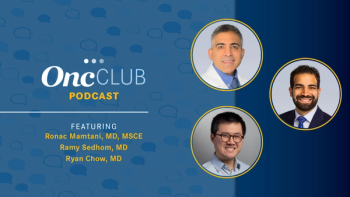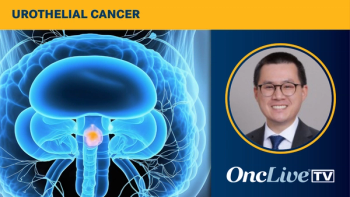
Pembrolizumab Plus Cabozantinib Improves ORR in Recurrent/Metastatic Head and Neck Squamous Cell Carcinoma

A doublet regimen comprised of pembrolizumab and cabozantinib elicited encouraging responses in patients with recurrent metastatic head and neck squamous cell carcinoma, meeting the primary end point of a phase 2 trial.
A doublet regimen comprised of pembrolizumab (Keytruda) and cabozantinib (Cabometyx) elicited encouraging responses in patients with recurrent metastatic head and neck squamous cell carcinoma (HNSCC), meeting the primary end point of a phase 2 trial (NCT03468218).1
In 33 evaluable patients, the combination produced an objective response rate of 54% (n = 18), which included a partial response rate of 54% and a stable disease rate of 36%; 9% of patients experienced disease progression. The clinical benefit rate achieved with the regimen was 91%.
“The combination of pembrolizumab and cabozantinib warrants further exploration in [this patient population,” Nabil F. Saba, MD, principal investigator, professor and vice chair in hematology and medical oncology, co-director of the Head and Neck Cancers Multidisciplinary Program, and the inaugural Lynne and Howard Halpern Chair in Head and Neck Cancer Research at Winship Cancer Institute of Emory University in Atlanta, GA, said in a presentation of the data.
Patients with recurrent or metastatic HNSCC are known to have a poor prognosis. PD-1 inhibitor monotherapy or combinations have served to prolong overall survival (OS), particularly in those who have PD-L1 expression. For this population, the pairing immune checkpoint inhibitors with receptor TKIs has emerged as a treatment approach of interest.
The open-label, multicenter, single-arm, phase 2 trial enrolled patients with inoperable, refractory or metastatic HNSCC who had measurable disease by RECIST v1.1 criteria, had received up to 1 prior radiation treatment to the head/neck, a life expectancy of more than 3 months, and an ECOG performance status of 0 or 1.
Patients who had human papillomavirus (HPV)–negative unknown primary disease or cavitating lesions or recent bleeding history, were excluded.
Study participants were administered intravenous pembrolizumab at 200 mg every 3 weeks in combination with oral cabozantinib at 40 mg daily. Tumor assessments were performed every 9 weeks in accordance with RECIST v1.1 criteria.
The primary objectives of the trial were to evaluate the safety and tolerability of the combination in this population, and to assess the ORR achieved with the regimen.
In the 36 patients enrolled to the trial who received treatment, the median age was 62 years (range, 54-67); 83% of patients were male. Regarding ECOG performance status, 50% of patients had a status of 0 and the remainder had a status of 1. Additionally, 47% of patients had HPV-positive disease, 33% had negative status, and 20% had unknown status.
Previous therapies received included radiation (89%), cisplatin (100%), and cetuximab (Erbitux; 8%). Regarding PD-L1 combined positive score (CPS), 6% had a score of less than 1, 44% had a score ranging from 1 to 19, and 50% had a score of 20 or higher.
Of the 36 patients treated, 29 discontinued. The most common reasons for doing so were because of adverse effects (AEs; n = 9), progressive disease (n = 9), death (n = 1), alternative therapy (n = 1), or withdrawal (n = 2). Seventeen patients required dose reductions. Seven patients are still on treatment; 3 are currently on 40 mg and 4 are on 20 mg.
Additional data presented at the 2022 ASCO Annual Meeting showed that at a median follow-up of 10.6 months (95% CI, 7.8-16.5), the median progression-free survival (PFS) with the regimen was 14.6 months (95% CI, 8.2-19.6). The 1-year PFS rate was 54.0% (95% CI, 31.5%-72.0%). The median overall survival (OS) was 22.3 months (95% CI, 11.7-32.9), and. the 1-year OS rate was 68.4% (95% CI, 45.1%-83.5%).
“The 1-year PFS of 54% and OS of 68% suggests clinical activity that exceeds single-agent pembrolizumab in the CPS of 20 or higher group,” Saba added.
In the group of patients with a PD-L1 CPS of less than 20, the median OS with the regimen was 14.6 months (95% CI, 8.2–not evaluable), and the 1-year OS rate was 54.9% (95% CI, 24.5%-77.5%). In the subset of patients with a PD-L1 CPS of 20 or higher, the median OS was 32.9 months (95% CI, 6.9-32.9), with a 1-year OS rate of 83.6% (95% CI, 48.0%-95.7%).
Regarding safety, the most common all-grade AEs included fatigue (44.4%), diarrhea (33.3%), hypothyroidism (33.3%), constipation (30.6%), dry mouth (27.8%), anorexia (25.0%), headache (25.0%), hypertension (25.0%), hyponatremia (25.0%), and oral mucositis (25.0%).
The most frequently experienced grade 3 or higher AEs comprised dysphagia (8.3%), hypertension (8.3%), increased aspartate (AST) or alanine (ALT) aminotransferase (8.3%), back pain (5.6%), hypotension (5.6%), oral mucositis (5.6%), anemia (2.8%), and anorexia (2.8%).
The most common grade 3 or higher treatment-related toxicities included AST increase (8.3%), hyponatremia (8.3%), gamma-glutamyl transferase increase (5.6%), lipase increase (5.6%), oral mucositis (5.6%), ALT/AST increase (2.8%), bilirubin increase (2.8%), and hypertension (2.8%).
“Treatment was overall well tolerated, and treatment-related toxicities were generally mitigated by cabozantinib dose reductions to 20 mg,” Saba noted. Specifically, 47.2% of patients required a dose reduction of cabozantinib.
“Tissue and blood biomarker analysis will be reported at a later date,” Saba concluded.
Reference
Saba NF, Ekpenyong A, McCook-Veal A, et al. A phase II trial of pembrolizumab and cabozantinib in patients with recurrent metastatic head and neck squamous cell carcinoma. J Clin Oncol. 2022;40(suppl 16):6008. doi:10.1200/JCO.2022.40.16_suppl.6008




































